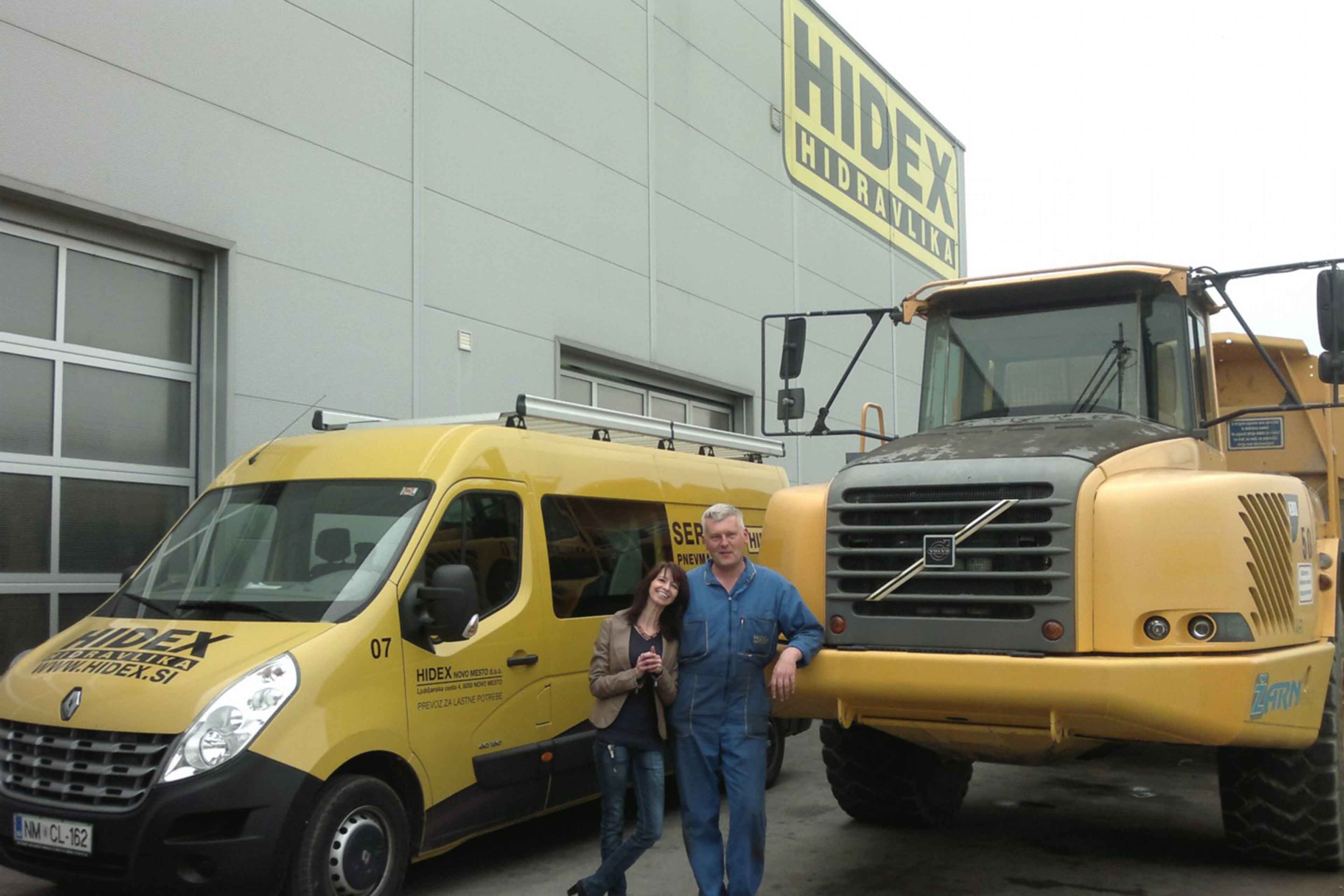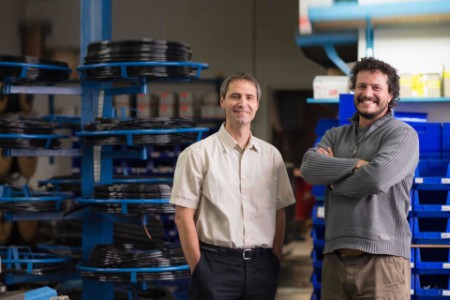Continuous accumulation of knowledge
In the early 1980s, Franc Vodopivec, an employee of a local road maintenance company, came up with the idea of an extra afternoon activity to supplement his family's monthly income. He knew that locally, nobody was offering services in the field of hydraulics, since the company he worked for sometimes had to look for spare parts in other countries. The difficult process of balancing his job and these additional afternoon activities often resulted in the latter continuing well into the night. In the following few years he arrived at a point when he had to opt for one or the other of his professional activities, as he was no longer able to perform both by himself. Therefore, in 1990 he founded the company Hidex.
He moved from the basement garage in Šentjernej to new premises in Novo Mesto and hired his first employees. Since then the company has grown and currently employs 25 staff, working in three service and retail outlets. “At the beginning he would come from work, where he was in charge of a workshop with 50 staff and, whenever it was necessary, continued at home, repairing pipes until midnight. There were no proper tools or materials available, so while almost everything was improvised, knowledge was accumulated constantly,” remembers son and current company director, Boris Vodopivec of his father's first entrepreneurial steps. When he was at elementary school he helped his father with lighter chores, but became more seriously involved in the business in high school, when he made sure that they started buying fixtures directly from factories abroad: “I was good at languages and at that time this was my added value, since I lacked both technical knowledge and experience.” While being indirectly involved in the company, he completed his doctorate in physics and briefly took up employment at the Jožef Stefan Institute and the Faculty of Mathematics and Physics and later in the high-tech enterprise, Cosylab. It was here that his transformation from physicist to project manager, working on particle accelerators took place. Only a few years later he faced the same dilemma as his father had many years before. “I had been consumed by the spirit of entrepreneurship,” he offers as an explanation of his decision to become completely involved in the family business.

The first opportunities abroad
Today the company has premises in Novo Mesto, Krško and Grosuplje. Their principal activities are the installation and servicing of hydraulic systems and distribution of their fixtures; from agricultural and construction machinery, to paper-making plants and hydroelectric power plants. Last year, the company generated €2 million of revenue and €93,000 of profit. “In order to maintain relatively stable growth, we are forced to turn our attention to the rest of the world,” says Boris, who wants to steer the company towards specialization in the field of complex mechanical engineering, combining hydraulics, pneumatics, mechanics and automation. Two years ago they completed their first major engineering project in Croatia and a similar project in Austria awaits their attention at the end of the year. Currently, the company operates mostly locally, providing services for domestic industrial customers, as a service support and maintenance contractor in larger factories.
The second generation of the company custodians
Boris began his active role in the company as the Managing Director. However, after the unexpected death of his father two years ago, he took over the duties of Director. “I feel a great sense of responsibility towards the company, but I do not feel a sense of ownership; I’m only a temporary custodian. Over the years the family and employees have invested an abundance of hard work and efforts into the company, and I feel it is my duty to take care of it, making sure it improves even further before I hand it over to the next custodian,” reflects Boris.
The company is still run as a family business and Boris's brother-in-law Brane Jerman is also involved as a Deputy Director. When looking for new employees, they always recruit personnel who bring to the business new technical ideas and improvements. “I'm not the driving force behind development, my colleagues are. As a rule, we employ people who are better than me, and therefore we are constantly looking for new talent,” admits Boris. They recruit mainly from the local rural environment, because these are the people with a high degree of labor-oriented values. “We are determined to make sure that work is primarily a source of joy and a challenge, and only secondarily a job. All this is ultimately reflected in our results, which are the work of exceptionally talented and skilled colleagues,” proudly points out Boris.
“When we work with subcontractors, we always choose those located closest to us. It is a big advantage for all if as much work as possible remains in the local environment. The subcontractors also grow and develop along with us, as we educate them through cooperation, ensuring they become more accessible and responsive than their counterparts from abroad,” adds Boris. “The fact is that we provide support to the industry. If the industry does not exist or migrates from Slovenia, we cannot count on growth. We must follow the industry.” These decisions have sometimes resulted in issues when implementing work outside the home environment. “The perception of where the work should be carried out has since changed and the Dolenjska borders no longer present the boundaries of our world. Only a few years ago we worked mainly in Dolenjska, and today our outlook stretches from Koper to Prekmurje and from Split to Vienna,” explains Boris.
“The perception of where the work should be carried out has since changed and the Dolenjska borders no longer present the boundaries of our world. Only a few years ago we worked mainly in Dolenjska, and today our outlook stretches from Koper to Prekmurje and from Split to Vienna,” explains Boris.
Development in the direction of machine manufacture
“Slowly the company is changing from one that sells the fruits of hardworking hands to a business that sells knowledge,” says Boris. “Our tradition can only be attributed to the fact that we are still following the principles set by the company founder. His ideas, advice and desire to explore new technological solutions continue to give impetus to the company, driving it forward,” explains Boris. Access to new technologies and tools, and therefore new challenges, enables the professional development of staff, who are left free to do their job to the best of their abilities. “Finding the right answers is therefore the responsibility of each individual,” adds Brane. The knowledge they have accumulated and years of experience allow them to be able to plan and assemble functioning machinery tailored to the individual requirements of industrial users. “Initially, some of our steps were rather uncertain, based on the principle: ‘the first machine is for us, the second for the neighbor and the third should be good enough for the market’. Now things are changing for the better, since most of the required skills and knowledge are available internally. To ensure quality, traceability and duplication, manual labor has been increasingly replaced by machines.”
Quality from the southern market
In the future, the company will have to change significantly if it is to remain successful and continue its growth. “Our aim is to become a ‘one stop shop’. Our customers’ time is valuable, opportunity costs are often very high, and if the challenges faced by customers can be solved in one place, so much the better for all involved. We intend to offer comprehensive services in the field of mechatronics and steer mechanical engineering in the direction of making individual solutions tailored to individual customers, rather than in the direction of serial products. Another goal is to move from services that generate low added value and focus on services that generate higher added value.”
Their target market was initially the Balkans, but due to pricing pressures and the desire to raise their services to a higher level of quality, they are focussing their attention towards the West. Foreign companies are highly specialized and provide services at a higher price, and it is here that they see the opportunity to further develop the business. In Germany they may be a provider of cheaper services; however, they must prove their worth as their clients see them as one of the companies from ‘the south’, where one can expect a low price, but not top quality. “We intend to become known for our top-quality and innovative solutions,” clearly stresses Boris.
Summary
Hidex in a nutshell: “Together we can create more.”


